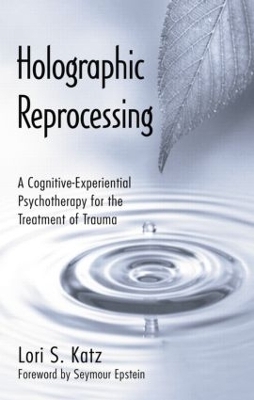
Holographic Reprocessing
Routledge (Verlag)
978-1-138-87276-9 (ISBN)
The hologram is used as a model for describing a pattern of these re-enactments - as each experience is a whole experience unto itself as well as being a part of a larger whole, and each experience contains information consistent with the larger pattern. The experience is holographic, and is termed an experiential hologram. These experiential holograms are holistic, integrative, and unique in terms of existing constructs such as a schema, belief, expectation, self-fulfilling prophecy, sensitivity, or script - constructs that are largely cognitive and only part of the holographic picture. The hologram also activates an experiential reaction including affect, sensations, and associations. The model of the experiential hologram is intended to more closely explain human experience, as it is assumed that experience itself is processed in a complex array of cognitions, affective reactions, sensations and associations.
Written by a clinical psychologist specializing in the trauma therapy, this volume will guide mental health professionals through the use of holographic reprocessing in their treatment of trauma victims, from sufferers of PTSD to rape victims.
Lori S. Katz, Ph.D. is the founder/director of the Women’s Mental Health Center at the Veteran’s Affairs Long Beach Healthcare System in California. She has served as a subject matter expert on treating sexual trauma to testify before the US Congress supporting lead witness Undersecretary of Health. Dr. Katz also served on a Department of Defense task force to write recommendations for new policies regarding care of victims of sexual assault in the US military. She has presented on the topic of treating trauma at national and international conferences. She has developed Holographic Reprocessing in her more than 15 years of work with trauma victims.
Part I: Theory. Overview of HR. Rational and Experiential Information Processing Systems. Holograms and Experiential Holograms. Six Components of an Experiential Hologram. Exposure Therapies and Reprocessing: Clarifying Concepts. Part II: Practice. The Therapeutic Alliance. Coping Skills I: Tolerating and Managing Affect. Coping Skills II: Skills for PTSD, Barriers to Learning and Implementing Skills, and Creating a "Feelings Plan". Experiential Discovery. Mapping Experiential Holograms. Reprocessing I: Overview and Non-arousing Exposure Techniques. Reprocessing II: Preparation. Reprocessing III: Techniques. Overcoming Barriers to Reprocessing and Building New Patterns. Holographic Reprocessing in Couples' Therapy. Family and Socio-cultural Experiential Holograms. Conclusion.
| Zusatzinfo | 2 Tables, black and white; 8 Illustrations, black and white |
|---|---|
| Verlagsort | London |
| Sprache | englisch |
| Maße | 152 x 229 mm |
| Gewicht | 362 g |
| Themenwelt | Medizin / Pharmazie ► Medizinische Fachgebiete ► Notfallmedizin |
| Medizin / Pharmazie ► Medizinische Fachgebiete ► Psychiatrie / Psychotherapie | |
| Sozialwissenschaften ► Soziologie | |
| ISBN-10 | 1-138-87276-8 / 1138872768 |
| ISBN-13 | 978-1-138-87276-9 / 9781138872769 |
| Zustand | Neuware |
| Haben Sie eine Frage zum Produkt? |
aus dem Bereich


